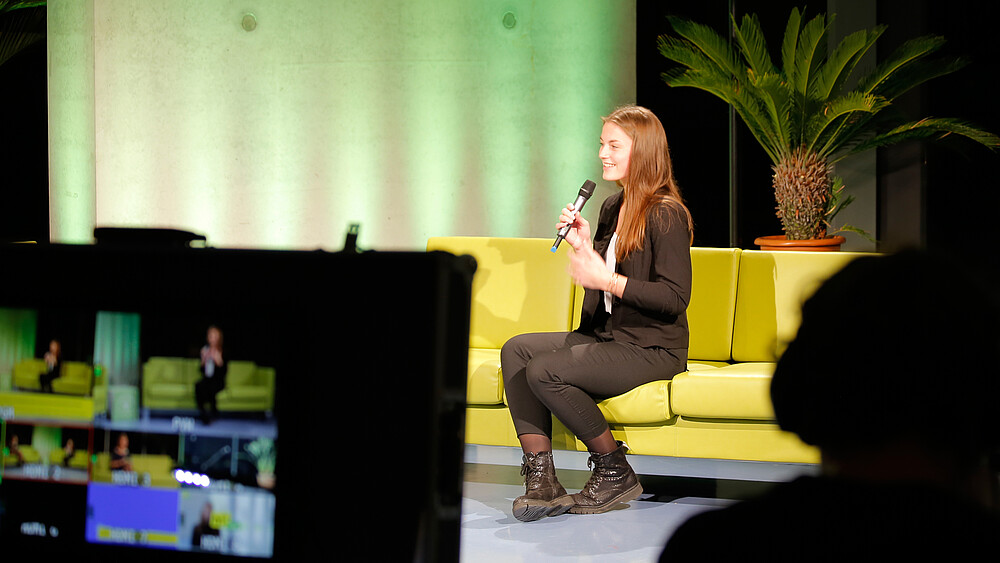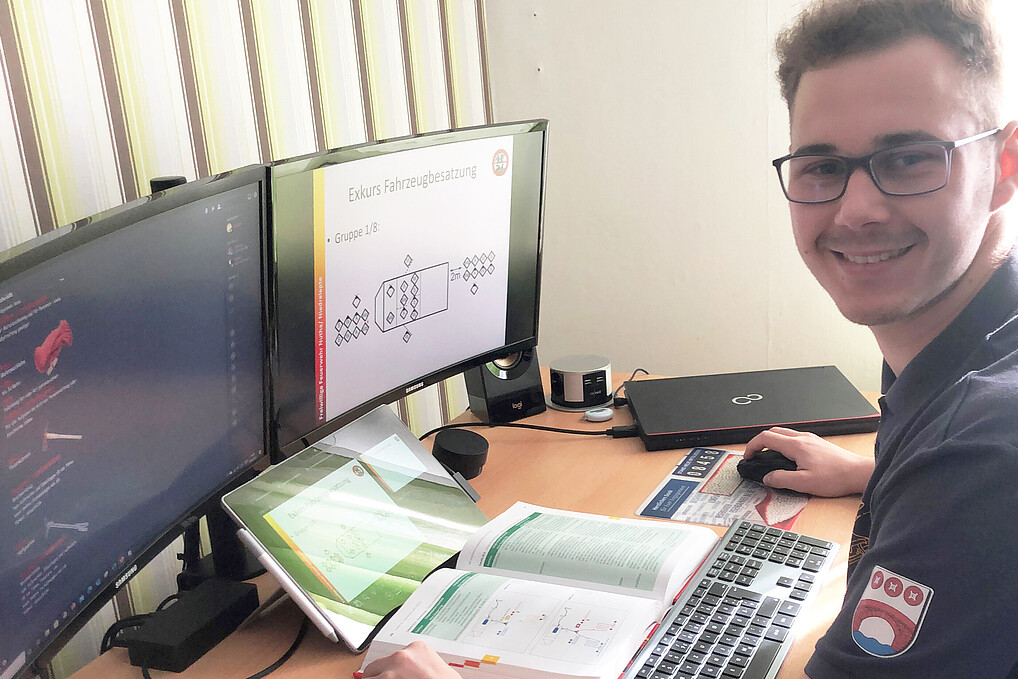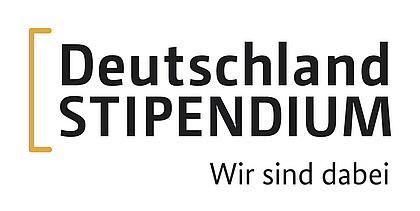Germany Scholarship holders report how they had to adapt their commitment during the pandemic. The scholarship helps.

The atmosphere is solemn and highly ceremonial. The Rector stands at the lectern and announces the new recipients of the Deutschlandstipendium scholarship at Zittau/Görlitz University of Applied Sciences in front of hundreds of spectators as part of the enrolment ceremony. He honors their commitment and assigns them their sponsors, who they will meet in person after the event.
This was the case in the past. Like many other events, the ceremonial presentation of certificates to the current Germany Scholarship holders had to be postponed due to the pandemic.
As part of the virtual enrolment ceremony last October, the 15 Germany Scholarship holders at the HSZG learned about their sponsors on their home computers and had to forego a formal get-together with their sponsors. And their above-average social commitment was also threatened with severe setbacks with regard to the measures associated with the lockdown.
But often only seemingly! For the HSZG scholarship holders, the restrictions were no reason to stop their often voluntary activities in associations or their internal university commitments. They simply adapted to the circumstances.

Just like Jamel Rejeb Bibani. He is in his seventh semester studying automation and mechatronics on the KIA Diplom degree course and is sponsored by ATN Hölzel GmbH. "The Deutschlandstipendium scholarship provides me with financial support for the constant commute between my employer in Magdeburg and my university in Zittau," says the 22-year-old about the benefits of the scholarship.
Jamel has been a member of the volunteer fire department in his home village near Zerbst in Saxony-Anhalt since he was ten years old. Last year, he took on the voluntary role of children's warden there, thereby supporting the youth work at the facility. But how can he promote training in the volunteer fire department when no personal contact is currently possible?
"I used to give the 10 to 16-year-olds practical instruction on site, which I really enjoyed. Now I instruct them online in a wide variety of tasks." From teaching guidelines and how to behave in an emergency to how to use protective equipment. The student now takes his protégés by the hand digitally. "How do you roll out a hose correctly and who does what in an emergency? These are all important rules that need to be taught," says Jamel. "And finally, they also need to be able to tell the difference between a breathing apparatus and a firefighter's helmet." The lessons are very good, but are by no means a substitute for personal contact. "But it's better than not having it at all."
For Victoria Otto, simply dropping her previous commitment was also out of the question. She is studying health care management and is sponsored by Minister President Michael Kretschmer, Member of Parliament Stephan Meyer and the Mayor of Görlitz Octavian Ursu.
Although the active show jumper no longer takes part in competitions, in the recent past she has concentrated more on her work as a board member of the Rosenhof Görlitz Riding and Driving Club. "We are and remain optimistic and are currently planning various courses and our Görlitz Summer Weeks, which are to take place this year in September," says the 22-year-old. She would also like to stand for re-election to the Faculty of Managerial and Cultural Studies Student Committee. "The Deutschlandstipendium gives me the security I need for this, especially when the internship is coming up," she says.
The topic of internship funding is also very important to Alexander Brugger. The 24-year-old is sponsored by Sparkasse Oberlausitz-Niederschlesien. He is studying computer science in Görlitz in his fifth semester at the HSZG. "Thanks to the Deutschlandstipendium scholarship, I was able to choose an internship that was a great fit in terms of the subject area but wasn't paid compared to other positions," says the Austrian-born student.
What commitment did he actually use to score points with the scholarship awarding committee? "As a student representative, I made it my mission to improve communication between computer scientists. To this end, I introduced 'mentoring' for computer science students together with the Faculty Student Committee. We currently have around ten mentors who take around 30 first-semester students by the hand and are always on hand to answer questions," says Alexander Brugger.
"Our goal is to network and motivate computer science students in their own class and across classes, to form learning groups and to achieve good academic success through this method. Now - in these difficult times for first-year students - we are trying to implement this online."
Ekaterina Poltorak is no stranger to communication either. She is currently in the third semester of her Master's degree in integrated management and is sponsored by GWT-TU Dresden. The 24-year-old native Russian works as a research assistant in the HSZG's International Office. She looks after Russian students who are studying at the university as part of exchange programs. "I help in the office with the preparation of documents that they need, for example for the registration office, banks and health insurance companies, make appointments and also accompany them to the authorities. My interpreting skills are often in demand."
Ekaterina is particularly pleased that, despite the coronavirus crisis, she is still able to maintain personal contact with the students. "We live together in the hall of residence as a shared flat. If there are any questions, the students can contact me easily and we also deal with the authorities together," she says of her part-time job.
Unfortunately, she currently has to do without personal contact in her voluntary work as a guitar teacher. But instead of canceling lessons, she is currently simply teaching interested students online.
"The Deutschlandstipendium has given me more time for myself and my studies and saved me from having to work in a pizzeria in addition to my work in the HSZG's International Office and as a guitar teacher in order to finance my life," she sums up with a smile.
The Deutschlandstipendium stands for a scholarship culture supported by the federal government, universities and private sponsors.
It supports talented and committed students at our university for one year with 300 euros per month. 150 of this is provided by private sponsors such as companies, foundations, alumni and other private individuals. The other 150 euros are provided by the federal government. In addition to good grades or academic achievements, social commitment and special personal achievements - such as successfully overcoming hurdles in one's own educational biography - are also taken into account when awarding the Deutschlandstipendium.
Anyone who is enrolled at the Zittau/Görlitz University of Applied Sciences or is applying for a study place can apply. You can find more information here.
Victoria Otto (sponsored by Minister President Michael Kretschmer, Member of Parliament Stephan Meyer and Mayor of Görlitz Octavian Ursu), Lieselotte Walther (Förderverein HSZG e.V.), Ekaterina Poltorak (GWT-TU Dresden), Nadine Friedl (IMMOFANT GmbH), Leon Tischer (ISS IMMOFANT Service Solution), Valentin Krug (EC Europ Coating GmbH), Nadja Elisa Hörig (ENEX Finanzpartner und Beteiligungsgesellschaft mbH), Alexander Brugger (Sparkasse Oberlausitz-Niederschlesien), Jamel Rejeb Bibani (ATN Hölzel GmbH), Tim Sadowski (TRUMPF Sachsen GmbH), Albrecht Schilling (AUKOM e.V.), Melina Guilbert (LEAG Lausitz Energie Kraftwerke AG), Nicole Maziarka (Wilhelm Weidemann Jugendstiftung), Anna Achtelstädter (Wilhelm Weidemann Jugendstiftung) and Alexandra Elisabeth Pohler (EUROIMMUN AG).
